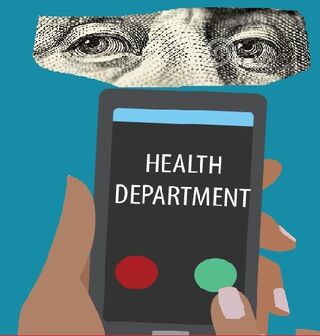Health
Contract Tracing—Is 'Big Brother' Watching?
In the era of “contact tracing," striking a balance between privacy and health.
Posted August 27, 2020

Almost every aspect of the SARS-CoV-2 pandemic involves technology impacting human behavior. People lining up for testing, medical heroes using a cutting edge tech to save lives, gene-sequencing in development of new vaccines … technology intersects keenly with human behavior and well-being.
One area where this is particularly so is “contact tracing”—not a technology, but a practice of disease prevention. Today, this practice is being employed on a scale not seen before, and using technology in brave new ways. Contact tracing typically involves public health staff calling patients who test positively for SARS-CoV-2.* If you are a “contact,” you are warned of your exposure, asked where you have been and who else you may have exposed, and advised to quarantine. The goal is to isolate exposed people before they spread the virus throughout the community. Governments usually hire contact tracers to manually call and reconstruct the movements of those exposed to the novel coronavirus. This is very labor intensive, so health agencies have developed electronic apps to "alert" if someone has tested positive. The Bluetooth app records whenever other devices with the same app are detected nearby. The recording of whose phones you came close to is ongoing and automated, so users are not necessarily aware that their location, status, or data is shared across the network.
If a user tests positive for SARS-CoV-2, the app alerts you, and the alert is also sent to any other users of the app who were near the infected person. If you were anywhere in range of someone with the contract tracing app who tested positive, you will get a text message alerting you that you were exposed, with recommendations to get tested and to self isolate. That is technology put to good use.
Different countries across the globe have deployed contact-tracing apps in different ways, from simple public health recommendations, to government mandates. The more people who download and use contact tracing apps, the more useful the data becomes. Experts say it may take up to 80% take-up rates of people opting-in for contact tracing apps to fully stop the pandemic.
Data about contract tracing in the U.S. shows that about half of those reached through contact tracing refused to disclose their contacts or whereabouts.(1) It seems that John/Jane Doe want privacy, and this illness remains highly stigmatized in our society, reducing self-disclosure.
Privacy issues are also a concern. For example, Singapore launched a mandatory “Safe Entry” app to require check-ins at clinics, schools, stores, and taxis. This type of effective contact tracing may keep us safer, but could also become an intrusive invasion of privacy. By trying to solve one problem, are we creating another?
At the University of Utah, researchers are developing a way to detect coronavirus using a smartphone—when someone with COVID-19 coughs, breathes, or sneezes onto a sensor, it detects if they are infected in about 60 seconds. The smartphone app is designed to send a message to let a government health agency know you just tested positive. There goes your privacy again!
From widespread testing, to monitoring a virus via your smart phone, technology is once again a tool that can be used for good, or possibly sinister user. It is up to consumers to support proper use of technology, preventing the misuse of well-intentioned tech that could evaporate our privacy.
Amid all the suffering and pain, technology as a blog topic may seem trivial. Yet make no mistake, there is a revolution taking place in how we are being tested and tracked. Will you download a tracking app? Does maintaining the health of many outweigh your personal privacy?
Will you opt in?


